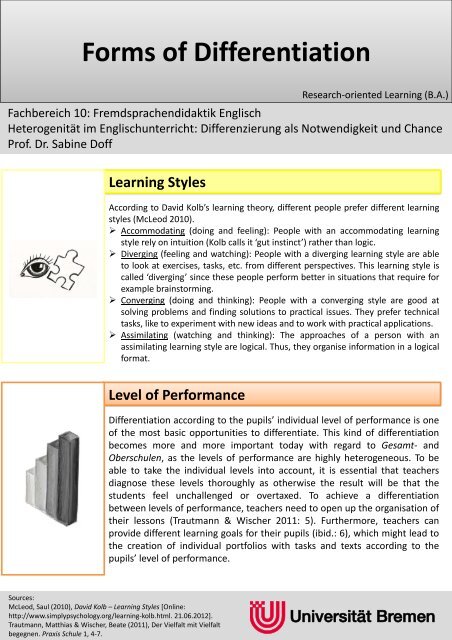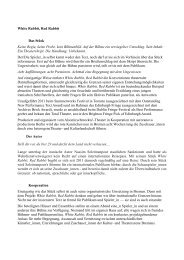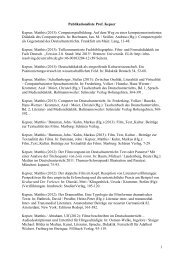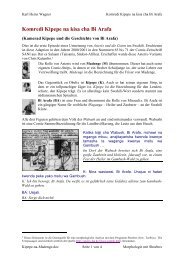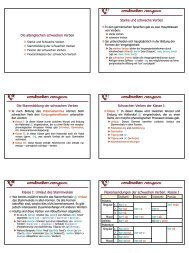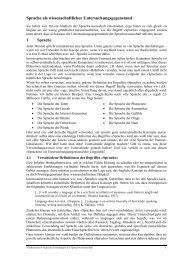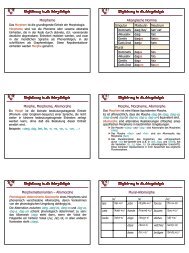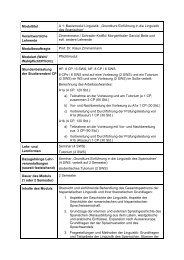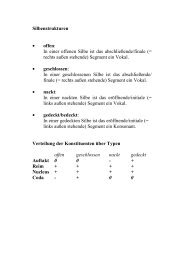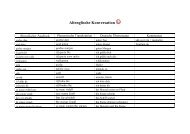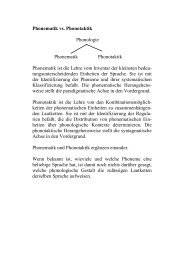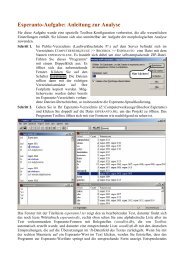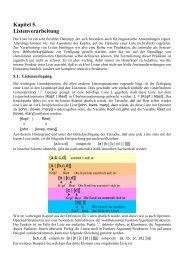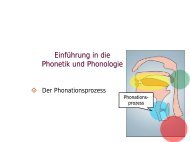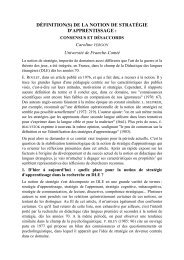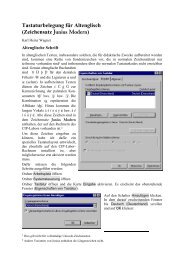Poster zusammengefasst, inkl. Lesezeichen - Fachbereich 10
Poster zusammengefasst, inkl. Lesezeichen - Fachbereich 10
Poster zusammengefasst, inkl. Lesezeichen - Fachbereich 10
You also want an ePaper? Increase the reach of your titles
YUMPU automatically turns print PDFs into web optimized ePapers that Google loves.
Icon<br />
Forms of Differentiation<br />
<strong>Fachbereich</strong> <strong>10</strong>: Fremdsprachendidaktik Englisch<br />
Heterogenität im Englischunterricht: Differenzierung als Notwendigkeit und Chance<br />
Prof. Dr. Sabine Doff<br />
Icon<br />
Learning Styles<br />
According to David Kolb’s learning theory, different people prefer different learning<br />
styles (McLeod 20<strong>10</strong>).<br />
Accommodating (doing and feeling): People with an accommodating learning<br />
Sources:<br />
McLeod, Saul (20<strong>10</strong>), David Kolb – Learning Styles [Online:<br />
http://www.simplypsychology.org/learning-kolb.html. 21.06.2012].<br />
Trautmann, Matthias & Wischer, Beate (2011), Der Vielfalt mit Vielfalt<br />
begegnen. Praxis Schule 1, 4-7.<br />
style rely on intuition (Kolb calls it ‘gut instinct’) rather than logic.<br />
Diverging (feeling and watching): People with a diverging learning style are able<br />
to look at exercises, tasks, etc. from different perspectives. This learning style is<br />
called ‘diverging’ since these people perform better in situations that require for<br />
example brainstorming.<br />
Converging (doing and thinking): People with a converging style are good at<br />
solving problems and finding solutions to practical issues. They prefer technical<br />
tasks, like to experiment with new ideas and to work with practical applications.<br />
Assimilating (watching and thinking): The approaches of a person with an<br />
assimilating learning style are logical. Thus, they organise information in a logical<br />
format.<br />
Level of Performance<br />
Differentiation according to the pupils’ individual level of performance is one<br />
of the most basic opportunities to differentiate. This kind of differentiation<br />
becomes more and more important today with regard to Gesamt- and<br />
Oberschulen, as the levels of performance are highly heterogeneous. To be<br />
able to take the individual levels into account, it is essential that teachers<br />
diagnose these levels thoroughly as otherwise the result will be that the<br />
students feel unchallenged or overtaxed. To achieve a differentiation<br />
between levels of performance, teachers need to open up the organisation of<br />
their lessons (Trautmann & Wischer 2011: 5). Furthermore, teachers can<br />
provide different learning goals for their pupils (ibid.: 6), which might lead to<br />
the creation of individual portfolios with tasks and texts according to the<br />
pupils’ level of performance.<br />
Research-oriented Learning (B.A.)


